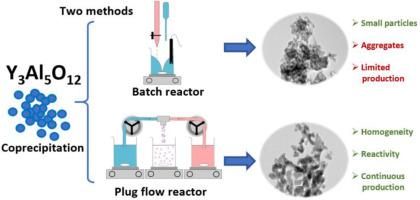钇铝石榴石(YAG)纳米粉体和陶瓷的制备:间歇式反应器与塞流式反应器的比较
IF 2.9
Q1 MATERIALS SCIENCE, CERAMICS
引用次数: 0
摘要
本研究采用反向共沉淀法合成了 YAG(Y3Al5O12)纳米粉体,并使用了两种不同设计的反应器:间歇式反应器和塞流式反应器。研究了反应器设计和合成温度对所合成纳米粉体特征的影响。反应器的设计决定了合成过程中 pH 值的变化和沉淀动力学。研究发现,反应器设计与纳米粉体的化学计量和形态之间存在相关性。塞流式反应器可以在煅烧后获得均匀、结晶良好和单相的 YAG 纳米粉体。然后,研究了获得的纳米粉体的烧结能力。利用塞流反应器制备的纳米粉体,结合单轴压制和 1700 ℃ 烧结,获得了完全致密的 YAG 基陶瓷。最后,塞流式反应器的设计非常简单且成本低廉,可以更容易地扩大具有良好形态和化学计量学控制的 YAG 基纳米粉体合成工艺的规模。因此,无需烧结添加剂就能获得基于 YAG 的透明陶瓷。本文章由计算机程序翻译,如有差异,请以英文原文为准。

Elaboration of Yttrium Aluminum Garnet (YAG) nanopowders and ceramics: Comparison between batch and plug-flow reactor
In this study YAG (Y3Al5O12) nanopowders have been synthetized by a reverse co-precipitation method with two different designs of reactors: batch and plug-flow. The impact of both the reactor design and the synthesis temperature on the features of nanopowders so-synthetized was studied. The reactor design governs the pH evolution and precipitation kinetics during synthesis. Correlations were found between the reactor design and nanopowders stoichiometry and morphology. The plug-flow reactor allows obtaining homogeneous, well-crystallized and single-phased YAG nanopowders after calcination. Then, the sintering ability of as-obtained nanopowders was investigated. Fully dense YAG-based ceramics were obtained with the nanopowders made from the plug-flow reactor by combining uniaxial pressing and sintering at 1700 °C. Finally, a plug-flow reactor with very simple and inexpensive design would allow easier upscale of the synthesis process of YAG-based nanopowders with well-controlled morphology and stoichiometry. As a result, YAG based transparent ceramic were obtained without sintering additive.
求助全文
通过发布文献求助,成功后即可免费获取论文全文。
去求助
来源期刊

Open Ceramics
Materials Science-Materials Chemistry
CiteScore
4.20
自引率
0.00%
发文量
102
审稿时长
67 days
 求助内容:
求助内容: 应助结果提醒方式:
应助结果提醒方式:


